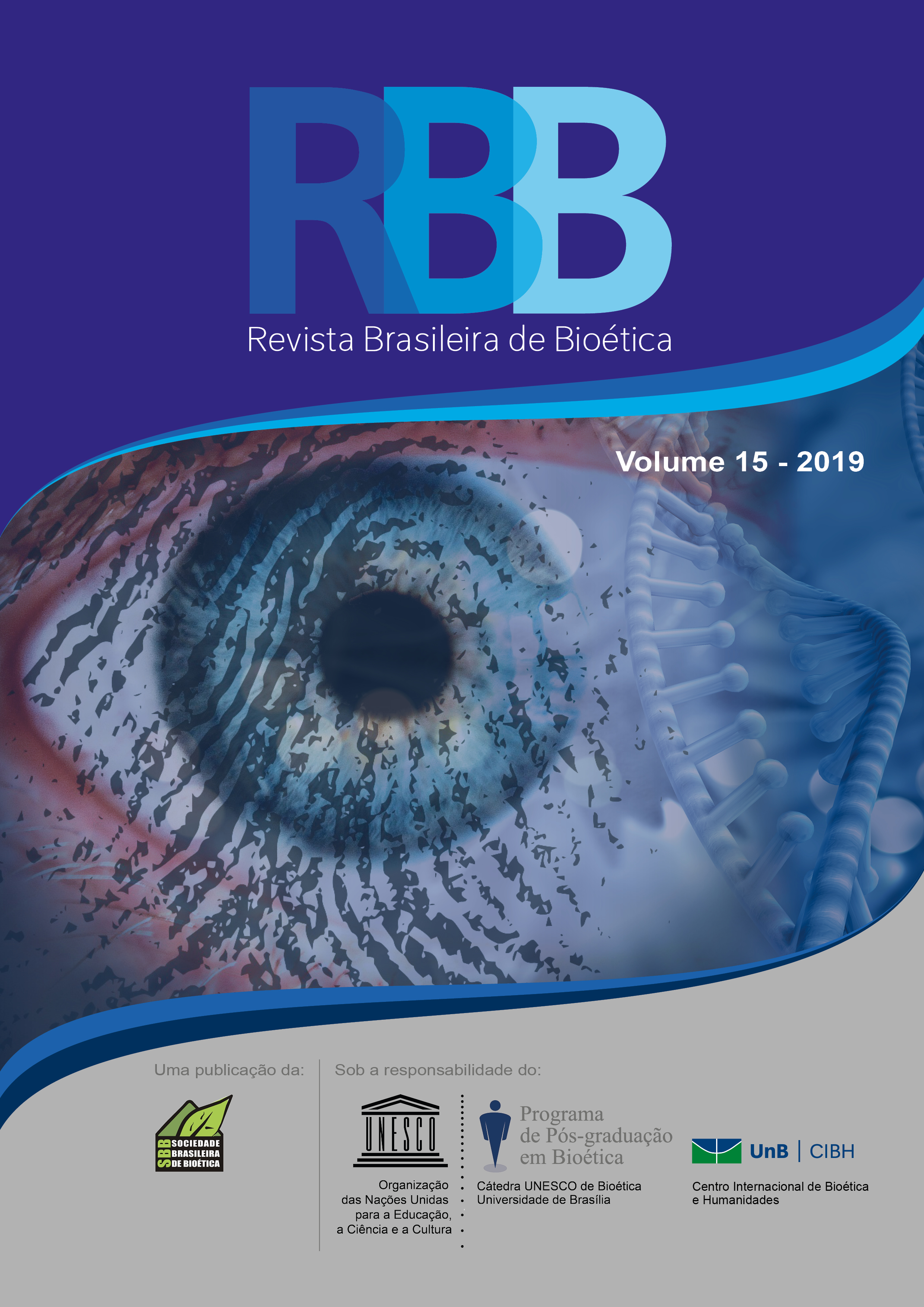Refugiados ambientais: desafios da bioética global
DOI:
https://doi.org/10.26512/rbb.v15.2019.23407Keywords:
Climate changes, Refugees, Environmental, MigrationAbstract
During the 21st century, global environmental changes have become recurrent, leading many people to move in order to survive. These displacements have been posed like a real threat, because the migration process has a strong impact on human life. This has given rise to a new type of refugee, called environmental refugee, who does not have a clear and well-defined concept on international law and national public policies, neither a widespread acceptance. The absence of consensus on the theorical and practical definitions and the variety of terms that have been used for these people who are forced to move through environmental problems do not protect them simply because of a concept of classification and nomenclature. In view of this, this article aims to analyze the concept and nomenclature of "environmental refugees", providing, through the theoretical approach of global bioethics, some guidelines for the confrontation of this reality that generates vulnerabilities.
Keywords: Climate changes. Refugees. Environmental. Migration.
Downloads
References
Andrade JHF. Direito Internacional dos Refugiados: Evolução Histórica. (1921 -
. Rio de Janeiro: Renovar. 1996.
Avila AM. “Uma Síntese Do Quarto Relatório Do IPCC.” Revista Multiciência
; 8: 163”“68. Acessível em: http://www.multiciencia.unicamp.br/artigos_08/
r01_8.pdf.
Benk, U. Qué es la globalización? Falacias del globalismo. Respuestas a la globalzación.
Barcelona: Paidós, 1988.
Black R. Environmental Refugees: Myth or Reality? Unhcr 2001; 34: 1”“19.
Brasil. Lei N 13.445. Institui a Lei de Migração. Diário Oficial [Da] República Federativa
Do Brasil, Poder Executivo, Brasília, DF, 24 Maio. 2017.
Cohen R. The Guiding Principles on Internal Displacement: An Innovation in International
Standard Setting. Global Governance. 2004; 10: 459”“480.
Coimbra P. Geografia: uma análise do espaço geográfico. São Paulo: Harbra; 2006.
Esquivel AP. Poluidor na Corte de Haia. Revista Veja; 2009.
in: El-Hinnawi E. Environmental Refugees. Nairobi: United Nations Environment
Programme. 1985.
Freitas CM, Carvalho ML, Ximenes EF, et al. Vulnerabilidade socioambiental, redução
de riscos de desastres e construção da resiliência - lições do terremoto no
Haiti e das chuvas fortes na Região Serrana, Brasil. Ciência & Saúde Coletiva
; 17(6): 1577-86.
Gotlib A. Refugees, Narratives, or How To Do Bad Things with Words. Kennedy
Institute of Ethics Journal 2017; 27(2): 65-86.
GRID (Global Report on Internal Displacement). Internal Displacement Monitoring
Center. 2017. Acessível em: https://reliefweb.int/sites/reliefweb.int/files/resources/
-GRID.pdf
IPCC, 2007: Climate Change 2007: Impacts, Adaptation and Vulnerability. Contribution
of Working Group II to the Fourth Assessment Report of the Intergovernmental
Panel on Climate Change, M.L. Parry, O.F. Canziani, J.P. Palutikof, P.J.
van der Linden and C.E. Hanson, Eds., Cambridge University Press, Cambridge,
UK, 976pp.
IPCC (Intergovernmental Panel on Climate Change). 2012. Summary for Policymakers.
In: Managing the Risks of Extreme Events and Disasters to Advance
Climate Change Adaptation [Field C.B., V. Barros, T.F. Stocker, D. Qin, D.J.
Dokken, K.L. Ebi, M.D. Mastrandrea, K.J. Mach, G.-K. Plattner, S.K. Allen, M.
Tignor, and P.M. Midgley (eds.)]. A Special Report of Working Groups I and II of
the Intergovernmental Panel on Climate Change. Cambridge University Press,
Cambridge, UK, and New York, NY, USA, 1-19.
Lopes A, Martin L, Ab’Saber AN, Hossne WS. O conceito de refugiado ambiental:
é uma questão bioética? Revista Bioethikos 2012; 6(4): 409 ”“15.
Mayer B. Pour en finir avec la notion de réfugiés environnementaux: Critique
d’une approche individualiste et universaliste des déplacements causés par des
changements environnementaux. Revue Internationale de Droit et Politique du
Développement Durable de McGill; 2011; 7(1): 33-58.
Mcadam J. Complementary protection and beyond: how states deal with human
rights protection. New Issues in Refugee Research 118: 2005. Acessível em:.
www.unhcr.org/afr/42fb1f045.pdf
Morrissey J. Rethinking the ‘Debate on Environmental Refugees’: from ‘Maximilists
and Minimalists’ to ‘Proponents and Critics. Journal of Political Ecology 2012;
: 36”“49.
Oliveira MJGS. Refugiados Ambientais: uma nova categoria de pessoas na ordem
jurídica internacional. Revista de Direito e Cidadania 2010; 7:123-32.
Pessini L. As origens da bioética: do credo bioético de Potter ao imperativo bioético
de Fritz Jahr. Revista Bioethikos 2013; 21(1): 9-19.
Potter VR. Global Bioethics: building on the Leopold Legacy. Lansing: Mihigan
State University Press. 1988.
Relações Exteriores, Ministério das. Refugiados e CONARE. Ministério das Relações
Exteriores, 2017.
Raiol IPC. Ultrapassando fronteiras: a proteção jurídica dos refugiados ambientais.
Porto Alegre: Núria Fabris. 2010.
Ramos EP. Refugiados ambientais : em busca de reconhecimento pelo direito
internacional. São Paulo: SP. 2011. Acessível em:. http://www.teses.usp.br/teses/
disponiveis/2/2135/tde-10082012-162021/publico/TESE_versao_integral_
ERIKA_PIRES_RAMOS.pdf
Renaud F, Bogardi J, Dun O, Warner K. Environmental Degradation and Migration.
Berlin-Institut. 2008. Acessível em: https://www.berlin-institut.org/fileadmin/
user_upload/handbuch_texte/pdf_Renaud_Environmental.pdf
Sganzerla A, Pessini L. As mudanças climáticas e seus impactos no reino da
vida: perspectivas para um futuro não apocalíptico. Revista Iberoamericana de
Bioética 2016; 2: 01-13.
UNHCR (UN Refugee Agency). A Situação dos Refugiados no Mundo: Cinquenta
anos de ação humanitária. Portugal: A Triunfadora Artes Gráficas. 2002.
UNHCR (UN Refugee Agency). Environmental migration governance. UNSW
Law Journal 1: 2009. Acessível em: https://ssrn.com/abstract=1412002.
UNRIC (United Nations Regional Information Center). Relatório para redução de riscos
de catástrofes. 2011. Acessível em: http://www.unric.org/pt/actualidade/32072-relatorio-
da-onu-afirma-que-90-por-cento-dos-desastres-tem-causas-meteorologicas.
UNHCR (UN Refugee Agency). Mid-year trends 2016. Acessível em: www.unhcr.
org/statistics/unhcrstats/58aa8f247/mid-year-trends-june-2016.html
Warner K, Martin S, Nassef Y, et al. Integrating Human Mobility Issues Within National
Adaptation Plans. UNU-EHS Publication Series, no. 9: 1”“52. 2014. Acessível
em: https://www.nanseninitiative.org/portfolio-item/intergrating-human-mobility-
issues/.
Yamamoto L, Serraglio AD, Cavedon-Capdeville FS. Human mobility in the context
of climate change and disasters: a South American approach. International
Journal of Climate Change Strategies and Management 2017; 10(1): 65-85.
Downloads
Published
How to Cite
Issue
Section
License
Copyright (c) 2019 Revista Brasileira de Bioética

This work is licensed under a Creative Commons Attribution-NonCommercial-ShareAlike 4.0 International License.



